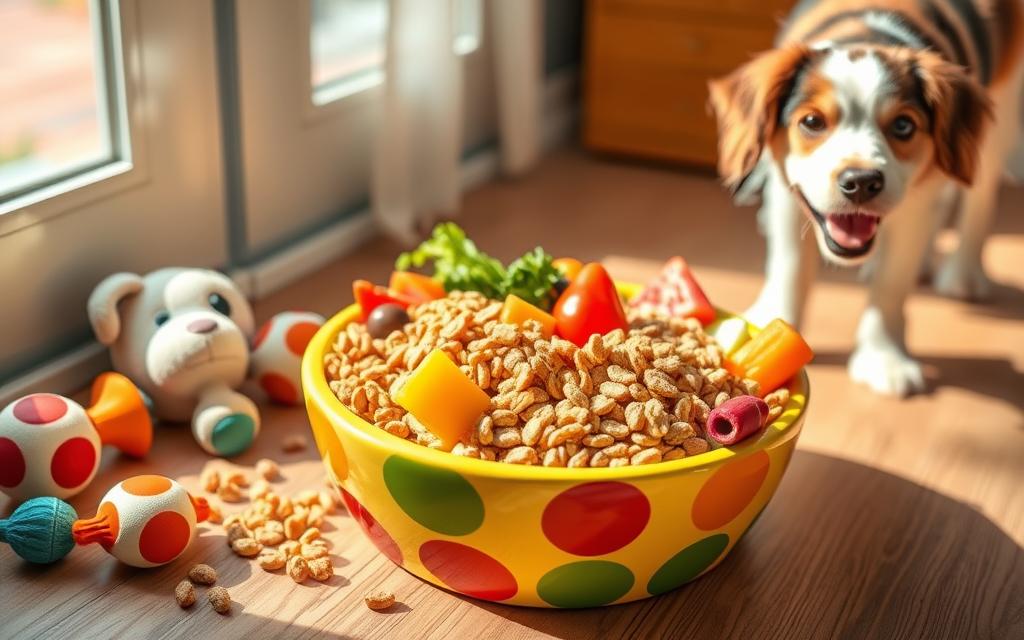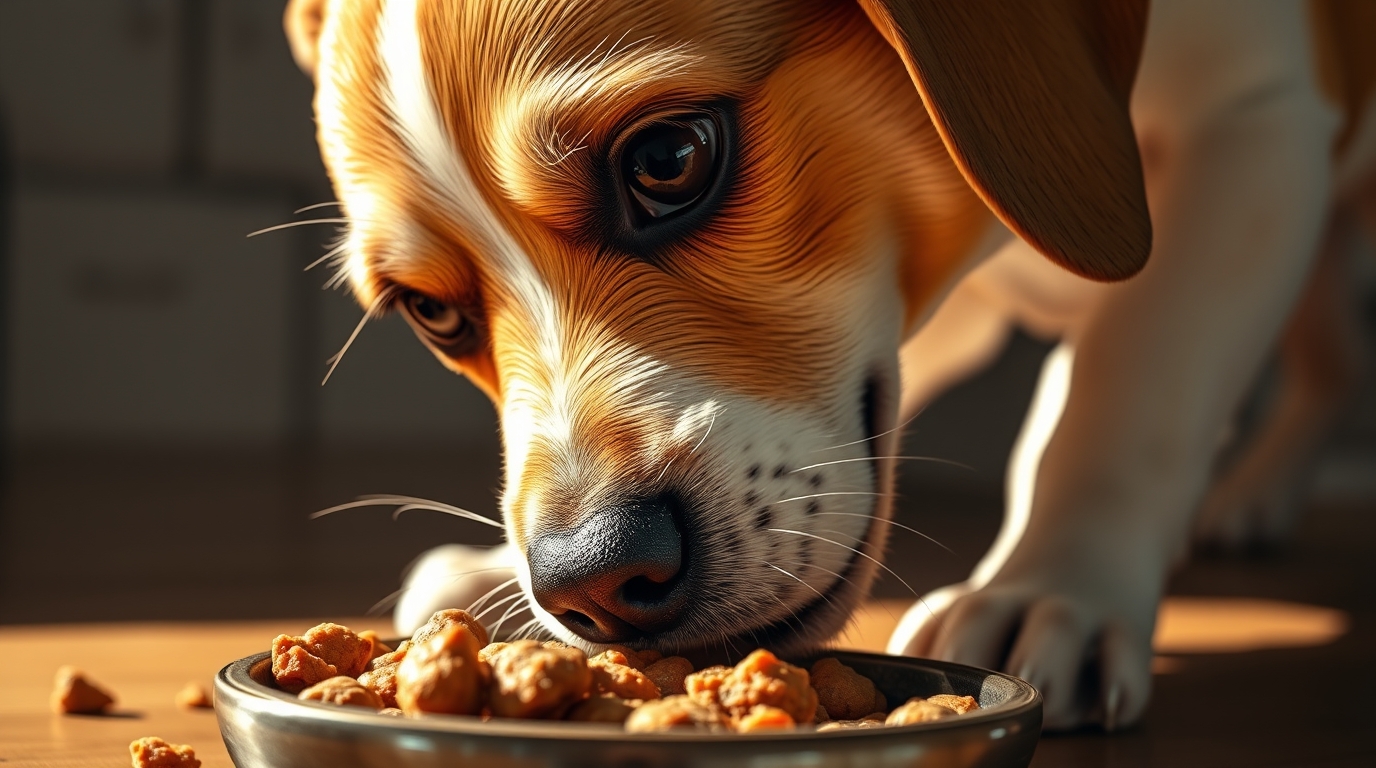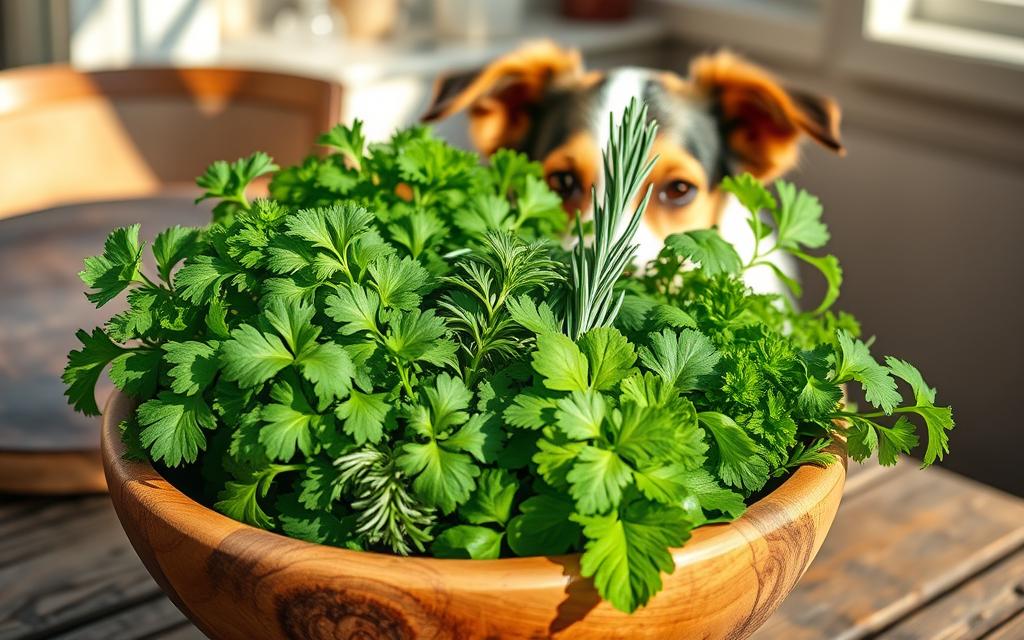Did you know that a 2001 study found that eating rotting apples can lead to alcohol poisoning in dogs1? This fact shows how important it is to know which human foods are safe for dogs. As dog owners, we must understand their nutritional needs and what foods they should avoid.
Dogs digest food differently than humans. Some human foods are good for them, while others can be harmful. This article will look at the best and worst human foods for dogs. It will also stress the importance of eating in moderation and preparing food properly123.
Knowing which foods are good for dogs helps us give them a balanced diet. This supports their health and happiness. We’ll cover fruits, veggies, proteins, and dairy. This guide will help you make smart choices for your dog’s meals.
Key Takeaways
- Some human foods, like rotting apples and chocolate, are very bad for dogs and can cause serious health problems.
- When giving dogs human food, it’s important to do so in small amounts. Even healthy foods like peanut butter and cheese can be harmful if eaten too much.
- Cooked, plain proteins like chicken and salmon are good for dogs. But raw meat can have harmful bacteria.
- Dogs should only have a little bit of dairy because many can’t digest lactose well.
- Talking to a vet is crucial to make sure your dog gets the right food and to find out about any food allergies or intolerances.
Understanding Your Dog’s Nutritional Needs
Ensuring your dog’s health starts with knowing their nutritional needs4. A balanced diet is key, providing proteins, carbs, fats, vitamins, and minerals4. The Association of American Feed Control Officials (AAFCO) suggests at least 22% dry matter protein for growth and 18% for maintenance4.
But, protein should not be more than 30% dry matter to avoid harm4.
The Importance of a Balanced Diet
Dogs can only make 13 amino acids, so they need 10 from their food5. Essential fatty acids like Linoleic acid, Omega-6, and Omega-3 are also vital for their health5. Carbohydrates from grains and veggies give them energy and support their intestines5.
A balanced diet also includes vitamins and minerals like Vitamin A, D, E, K, B-complex vitamins, calcium, and phosphorus5. These support healthy bones5.
Common Dog Dietary Requirements
Factors like growth, age, activity level, and breed affect a dog’s energy needs4. Dogs need fresh water, making up more than half of their body weight5. Adult dogs usually need one or two meals a day, with larger breeds needing two to prevent overeating5.
It’s crucial to follow AAFCO’s guidelines for a balanced diet5.
Treats and table scraps should not make up more than 10% of their daily calories5. This prevents weight gain and health issues like diabetes and heart disease5. Nutrient supplements can be dangerous, so a balanced diet should provide all necessary vitamins and minerals5. Talking to a vet can help find the best diet and feeding schedule for your dog’s health5.
By understanding your dog’s nutritional needs and providing a balanced diet, you can ensure their long-term health and well-being6.
Safe Human Foods for Dogs
Many human foods are not good for dogs, but some are safe and healthy. You can give your dog tasty fruits, crunchy veggies, and wholesome grains. These foods can be a great addition to their diet.
Fruits: A Tasty Treat
Fruits are a great, low-calorie snack for dogs. Safe choices include apples (without seeds), blueberries, and watermelon (seedless)7. These fruits are not only yummy but also full of antioxidants. Antioxidants help keep an aging dog’s brain healthy and reduce cognitive problems7.
Vegetables: Crunchy Goodness
Vegetables are also good for dogs. Carrots, green beans, and cucumbers are crunchy and low in calories. They help dogs chew naturally7. Other safe veggies include peas, broccoli, sweet potato, celery, butternut squash, spinach, and beets7.
Grains: Including Rice and Oats
Some grains are good for dogs. Boiled white rice is safe, especially with boiled chicken for upset stomachs7. Cooked oatmeal adds vitamins B and linoleic acid, which are good for a dog’s coat and skin8. While pasta, potato, and bread are okay in small amounts, they can be hard to digest7.
Always introduce new foods slowly and in small amounts. This helps your dog’s stomach adjust. It’s also a good idea to talk to your vet, especially if your dog has health issues or special dietary needs.
Unsafe Human Foods for Dogs
Some human foods are safe for dogs, but many are dangerous9. Toxic substances in household items can cause serious health problems. These include vomiting, diarrhea, seizures, and even death in pets9. It’s important for pet owners to know which foods are harmful and keep their dogs safe.
Chocolate: A Sweet Poison
Chocolate is a big no-no for dogs9. It contains methylxanthines, which can make dogs vomit, have diarrhea, and even have seizures9. Even a little bit of chocolate can be dangerous, so dogs should never get it.
Grapes and Raisins: Hidden Dangers
Grapes and raisins are also very dangerous for dogs9. They contain tartaric acid that can cause kidney failure in dogs9. If a dog eats these, it may vomit a lot and seem very tired. They need to see a vet right away.
Onions and Garlic: Watch Out!
Onions, garlic, and other Allium family foods are bad for dogs9. They can upset a dog’s stomach and cause anemia, which is very serious9. Owners should watch out for these in food and pet food.
Other foods to avoid include macadamia nuts, xylitol, and alcohol9. Eating these can make dogs weak, depressed, have seizures, and even die9. If a dog eats something bad, they need to see a vet fast.
Being a good pet owner means knowing which human foods are bad for dogs9. By learning and watching out, we can make sure our dogs are healthy and happy.
Proteins: What’s Safe to Share?
Lean and cooked proteins are great for your dog’s diet. Chicken, turkey, and lean beef are top choices, packed with nutrients when cooked right10. Make sure these meats are plain and without seasonings for your dog’s safety10.
Fish like salmon and tuna are good for dogs, full of omega-3 fatty acids10. Always remove bones before giving it to your dog. Eggs are safe too, but they must be fully cooked10.
While cooked meat for dogs is healthy, avoid raw or undercooked meat to prevent bacterial infections11. Also, steer clear of processed meats like sausages and hot dogs. They’re too salty and fatty for your dog11.

Cooked Meats: Best Practices
When cooking meat for your dog, keep it simple. Boil, bake, or grill without seasonings, oils, or sauces. This way, your dog gets the lean protein sources they need without harmful additives10.
Avoiding Processed Meats
Stay away from processed meats like hot dogs, sausages, and deli meats. They’re too salty, fatty, and full of additives for dogs11. Choose whole, cooked meat for dogs for the best protein options1011.
Dairy Products: Treat or Trouble?
Dairy products can be a tricky topic for dog owners. Some dogs can handle dairy just fine, while others might get upset stomachs. Navigating the world of dairy for dogs requires a delicate balance.
Cheese: A Popular Choice
Cheese can be a tasty treat for many dogs. But, it’s important to pick the right kind. Low-fat options like cottage cheese or plain yogurt are better because they have less lactose. Hard cheeses, such as cheddar or Swiss, tend to be better tolerated as they have a lower lactose content.12 It’s also important to remember that even dogs who can handle dairy might get upset stomachs if they eat too much.
Milk: Moderation is Key
Milk should be given in small amounts to dogs. Adult dogs often lack sufficient levels of the lactase enzyme needed to properly digest milk.13 This can cause problems like bloating, gas, diarrhea, and vomiting13. Puppies can handle their mother’s milk better, but as they grow older, they might start to have trouble with lactose intolerance13.
If your dog seems to do okay with dairy, a little bit of cow’s milk or goat’s milk is okay13. But, watch how they react and stop if they start to have digestive problems. Safer alternatives, such as plant-based milk options, can be a better choice for lactose-intolerant pups.13
| Dairy Product | Tolerance Level | Potential Risks |
|---|---|---|
| Cottage Cheese | High | Low risk of digestive issues |
| Cheddar Cheese | Moderate | Moderate risk of digestive issues |
| Whole Milk | Low | High risk of digestive issues, obesity, and pancreatitis |
| Almond Milk | High | Low risk of adverse reactions |
When it comes to dairy for dogs, it’s crucial to watch how your dog reacts. Gradual introduction and close observation can help ensure your furry friend enjoys the occasional dairy treat without experiencing digestive distress.12
Herbs and Spices: Which Are Safe?
Feeding your dog right means watching what herbs and spices you use. Some are good, but others can be very bad14. Let’s look at the safe and unsafe choices for your furry friend.
Safe Additions: Parsley and Basil
Not all herbs are bad for dogs. Parsley can freshen their breath, and basil has anti-inflammatory effects15. These herbs can add flavor without harming your dog.
Unsafe Choices: Nutmeg and Others
But, many spices are not safe for dogs14. Nutmeg can cause seizures, and garlic and onion powder can harm their blood cells15. It’s safer to avoid seasoning their food and stick to plain options.
Knowing which herbs and spices are safe is key to your dog’s health14. By choosing the right foods, you can keep your dog happy and healthy.

Always talk to your vet about your dog’s diet16. They can help you pick the right herbs and spices for your pet.
Preparing Human Food for Your Dog
We often want to give our dogs the same tasty meals we enjoy. But, it’s key to know how to cook and portion human food for dogs17. Homemade dog food is gaining popularity for its controlled ingredients and safety from recalls17. It’s cheaper than fresh or raw commercial food but pricier than kibble17.
Cooking Methods to Consider
Stick to simple, healthy cooking methods for your dog. Boiling, steaming, or baking without fats or seasonings are good choices. Avoid fried or oily foods as they’re hard for dogs to digest17. A homemade dog diet should have 10% protein, up to 50% carbs, 2.5-4.5% fiber, 5.5% fat, and dog-specific vitamins and minerals17.
Portion Control: Finding the Right Amount
Getting the right amount of food is key when feeding your dog homemade meals17. A 15-lb dog needs about 443 kcal a day, and homemade food has about 1.51 kcal per gram17. Treats, including human food, should not make up more than 10% of their daily calories17. Use a food scale to weigh ingredients accurately17.
Refrigerated homemade food lasts 3-4 days, while frozen lasts two months17. It’s vital to follow recipes exactly for a balanced diet17.
Adding supplements like calcium citrate and cod liver oil can boost nutrition17. Weigh your dog weekly and adjust food portions based on their weight and health17.
Knowing how to cook and portion human food for your dog lets you give them tasty, nutritious meals171819.
Signs of Allergies or Intolerance in Dogs
Dog food allergies are rare, affecting only about 0.2% of dogs20. Yet, it’s crucial for pet owners to know the signs. Dogs can react to certain foods, causing various problems21. Look out for itchy skin, skin infections, ear infections, and stomach issues like vomiting or diarrhea21.
Common Symptoms to Watch For
- Itchy skin (non-seasonal)
- Repeated skin infections
- Smelly skin due to yeast infection
- Changes to the skin and coat (hair loss)
- Recurring ear infections
- Diarrhea, soft stools, and straining to pass stools
- Excess wind (burping and flatulence)
- Sickness, reduced appetite, and weight loss
- Lack of energy or tiredness, and restlessness
Cats with food allergies may itch all over, itch more around their head, have diarrhea, and even get sick21. These allergies can start at any age, even if they’ve always eaten the same food22.
What to Do If Your Dog is Allergic
If you think your dog has a food allergy, see a vet right away. They might suggest an elimination diet trial to find the problem ingredient2122. Once found, avoid that ingredient to manage symptoms21. Your vet might also give medications like Apoquel®, Cytopoint®, antihistamines, or steroids to help20.
Remember, food allergies in pets can’t be cured but can be managed20. With your vet’s help, you can make your dog’s life better by changing their diet and avoiding certain foods20.
Consult with Your Veterinarian
Getting advice from a vet is key for your dog’s diet. Vets give advice based on your dog’s age, breed, health, and diet needs23. Regular vet visits help keep an eye on your dog’s weight and health23.
They can spot problems or allergies early, keeping your dog happy and healthy24.
Importance of Professional Advice
Finding the right dog food can be hard, but your vet is here to help. They know how to navigate through all the food options and what’s best for your dog23. By talking to your vet, you can be sure any diet changes are safe and right for your dog24.
Regular Check-ups for Health Monitoring
Regular vet visits are important for watching your dog’s health and weight23. Your vet can check if your dog’s food is good for them and make changes if needed23. Catching problems early, like allergies, helps keep your dog healthy24.
Going to the vet regularly is part of being a good pet owner. It helps keep your dog healthy and happy for a long time.




